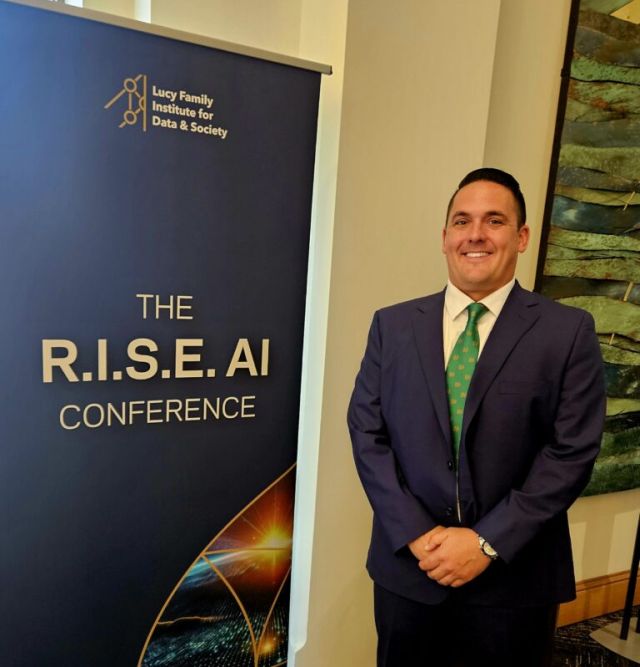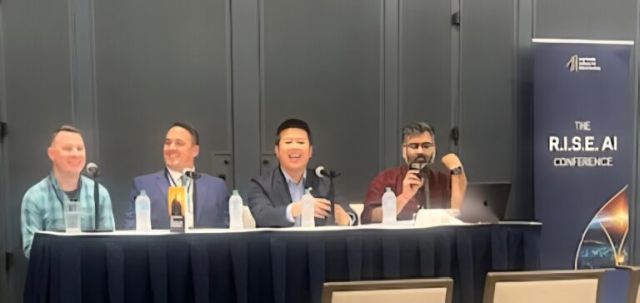- within Technology topic(s)
- in European Union
- with readers working within the Pharmaceuticals & BioTech and Retail & Leisure industries
- within Law Department Performance, Accounting and Audit and Law Practice Management topic(s)
Duane Morris Takeaways: Artificial Intelligence has brilliantly transformed society to the point where no industry can fully separate from its impact. But the fruits of this technology must be carefully curated to ensure that its adoption is ethical. An evolving legislative landscape and billion-dollar class action litigation industry loom large.
This week, at the University of Notre Dame's inaugural R.I.S.E. AI Conference in South Bend, Indiana, Partner Alex W. Karasik of the Duane Morris Class Action Defense Group was a panelist at the highly anticipated session, "Challenges And Opportunities For Responsible Adoption Of AI." The Conference, which had over 300 attendees from 16 countries, produced excellent dialogues on how cutting-edge technologies can both solve and create problems, including class action litigation.

The Conference covered a wide range of global issues affected by AI. Some of the topics included AI's impact on data privacy, information governance, healthcare, education, voting, and its overall impact on Latin America – including discussions about how large language models are developing when machines are trained in non-English languages. For organizations who deploy this technology, or are thinking about doing so, the Conference was informative in terms of AI's utility and risk. The sessions provided valuable insight from a broad range of constituents, including business leaders, world-renowned academic scholars, technology professionals – and a lawyer from Chicago.

I had the privilege of discussing AI's integration into the workplace in two areas: (1) proactive implementation; and (2) reactive class action litigation risk. There is no "one-size-fits-all" checklist for organizations to incorporate AI. But there are several overarching principles that will likely be important factors when establishing an ethical and legally compliant AI framework. These include: (1) creating an AI steering committee with a diverse collection of viewpoints, including Legal, HR, IT, business operations, and other end-users – such as tech-savvy employees – who can collectively opine on the benefits and concerns of AI in the workplace; (2) crafting a robust yet unambiguous policy to ensure that all members of an organization as using AI responsibly and consistently; (3) implementing training programs for both managers and employees on how to equitably implement the AI policy, and understand its interplay with other policies such as EEO; (4) communicating with AI vendors to understand how AI models were trained; and (5) conducting audits before and after implementation to ensure AI use does not result in a disparate impact on certain demographics of applicants or employees.
From a litigation perspective, I discussed the "moving target" of AI laws popping up around the country, which may create compliance challenges. While most of these laws are guided by the same fundamental principles (i.e. transparency and disclosure when AI is being used in the hiring process), accounting for minor variations may ultimately present compliance challenges for employers with national and international operations. The class action litigation and EEOC-initiated systemic discrimination litigation will inevitably follow — as the EEOC v. iTutorGroup, Inc., et al., Case No. 1:22-CV-02565 (E.D.N.Y.) settlement (see our blog post) and currently pending Mobley v. Workday, Inc., Case No. 3:23-CV-00770 (N.D. Cal.) class action lawsuit (see our blog post) confirm.
Overall, I was amazed by the amount of business and academic talent at the Conference. The Conference was an incubator for issue-spotting, brainstorming, and problem-solving. I am grateful for the opportunity to learn about the statistical impact of AI on organizations – and thankful to my many new PhD friends for sharing explanations of their empirical studies. Looking forward, I am optimistic that when constituents from all over the world in a variety of professions collaborate together, we will responsibly unlock AI's greatest potential.
For more information about Duane Morris's endeavors in the Artificial Intelligence space, please visit our Firm's AI webpage here.
Disclaimer: This Alert has been prepared and published for informational purposes only and is not offered, nor should be construed, as legal advice. For more information, please see the firm's full disclaimer.
[View Source]
